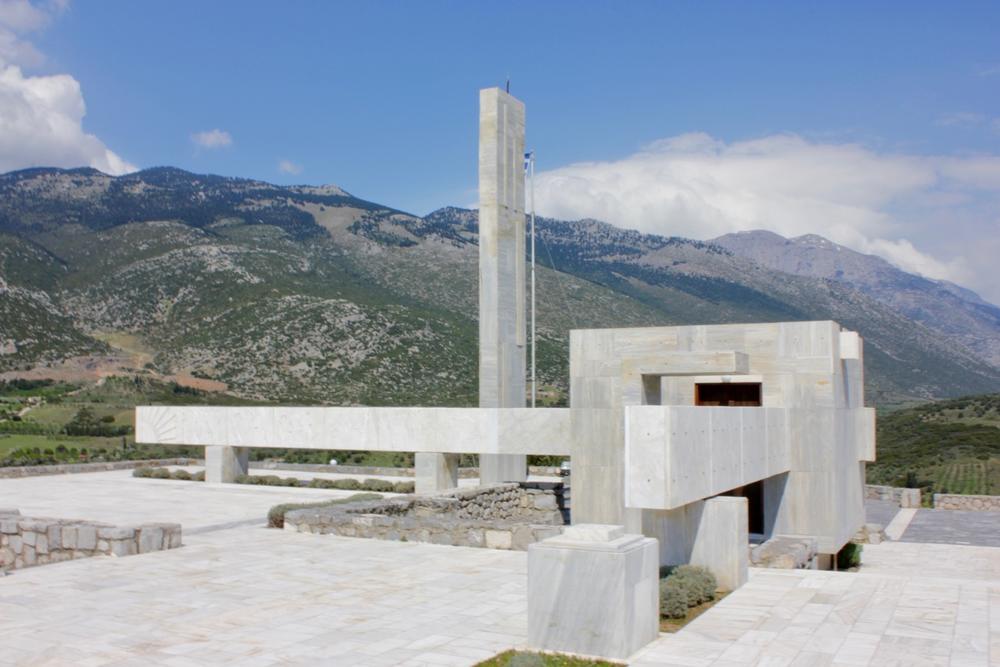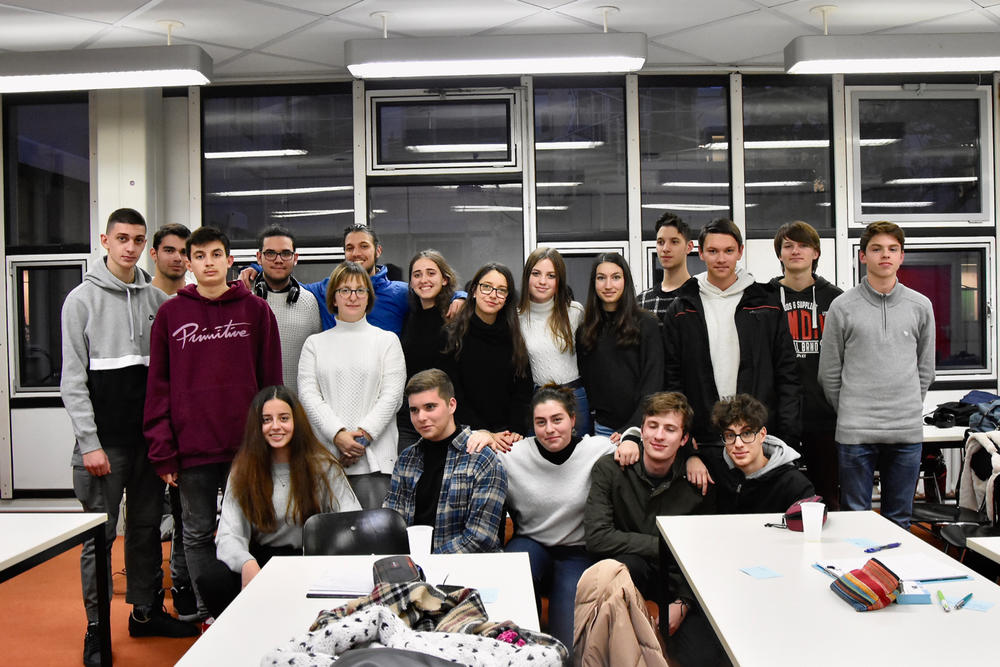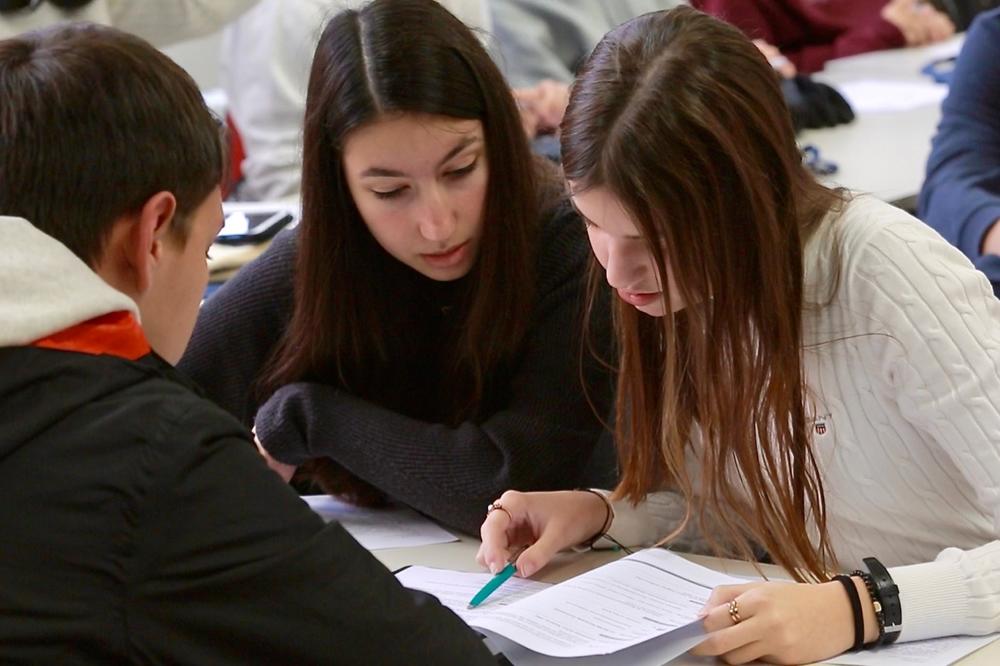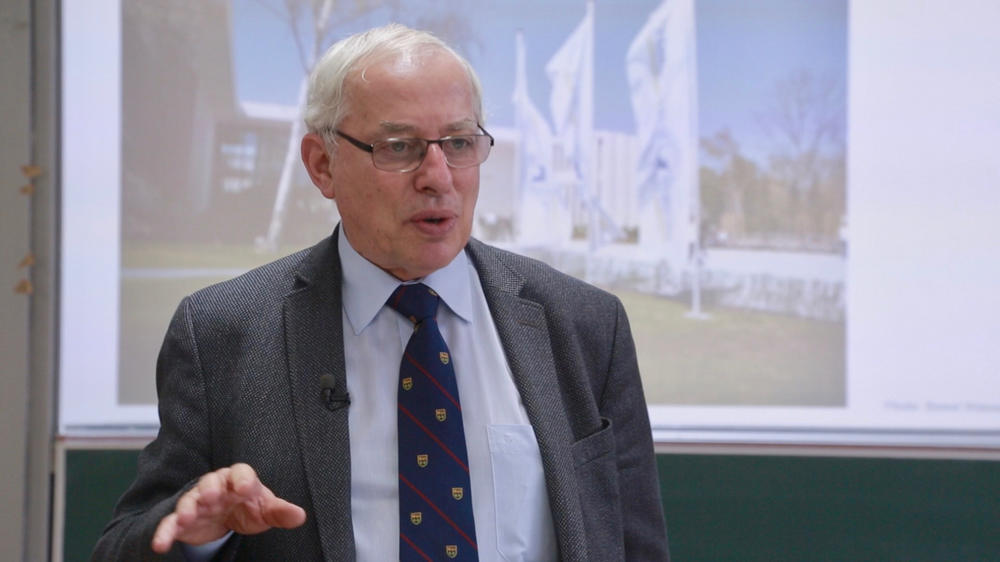“No affected family can forget what happened”
June 10, 1944: 76 years ago, German occupiers murdered the inhabitants of the Greek town of Distomo. At the end of last year, young people from the German School of Athens and the Distomo Lyceum discussed memories of the massacre.
Jun 22, 2020
Political education at the historical site: Every year students from the German School in Athens and the Distomo Lyceum visit the memorial in Distomo.
Image Credit: Regina Wiesinger
Memories of the end of World War II in Europe 75 years ago and liberation from National Socialism are common in Germany during these weeks. On May 8, German Federal President Frank-Walter Steinmeier spoke of the need for remembrance, something the Germans have been dealing with since the end of the war. President Steinmeier warned against calling an end to remembering, as that would devalue all the good things achieved since then, even to the extent of denying the very essence of the democracy established in Germany. Along with Chancellor Angela Merkel, he recalled and commemorated the countless victims of the war and National Socialism.
The residents of Distomo, Greece, were among the victims of Nazi retaliations. On June 10, 2020, on the 76th anniversary of the massacre, there will be a commemoration ceremony in Distomo for one of the most brutal war crimes committed by the German occupying power.
Many German vacationers in Greece probably drive past the small town of Distomo at the foot of the Parnass Mountains without stopping. Excursion buses from Delphi taking them to the famous Hosios Loukas monastery bypass Distomo, which is located between steep mountain slopes. On June 10, 1944, members of an SS police division caused a bloodbath there. As a “punitive measure” for a guerrilla attack in which three German soldiers were killed, they cruelly murdered all 218 defenseless residents, including 30 infants and young children. Finally, they set fire to the houses.
The German public knows little about the German occupation in Greece during World War II. The survivors of the war crime in Distomo have not received any compensation, nor have the perpetrators been charged, let alone convicted. A lawsuit by survivors before the German Federal Court of Justice in 2003 was unsuccessful.
Students from the German School in Athens and the Distomo Lyceum visited Freie Universität Berlin last December.
Image Credit: Sören Maahs
They took part in a workshop at Freie Universität about how to conduct interviews with contemporary witnesses, how film editing works, and how to design a website.
Image Credit: Tasos Telloglou
Today, 76 years later, memories of the massacre live on in Greece. This is partly due to the long-term student encounter projects of the German School in Athens and the Distomo Lyceum. Since the mid-1990s, school classes from the German School in Athens have been taking part in the commemorations in Distomo at the historical location. Regina Wiesinger, who teaches at the German School in Athens, noted that the exchange with Distomo intensified about ten years ago. The encounter project includes joint trips to German and Greek memorial sites as well as interviews with eyewitnesses.
Workshop at Freie Universität
Last December, before the outbreak of the coronavirus pandemic, 21 eleventh graders from both schools attended a workshop at Freie Universität. The journalist Tasos Telloglou, well known in Greece, accompanied the students with a camera team to report for Greek television.
The workshop was organized as part of the research and education project Memories of the Occupation in Greece that is based at Freie Universität Berlin. The extensive oral history project at the Center for Digital Systems (CeDiS) includes almost 100 life history interviews with contemporary witnesses, including resistance fighters, concentration camp survivors, Jews, and survivors of war crimes. Argyris Sfountouris from Distomo, for example, as well as many other eyewitnesses from Kalavryta and other martyrdoms on mainland Greece and the islands were interviewed. The project focusses on people’s personal experiences.
The online archive and the associated educational platform were created to function as an extensive digital historical memory intended to make the German occupation in Greece tangible, especially for the young generation in German and Greek schools.
The project was initiated by Nicolas Apostolopoulos, a professor of media education at the Department of Education and Psychology at Freie Universität Berlin and long-time director of CeDiS. He says, “I hope that the archive will be used as a tool in history lessons at high schools in both Greece and Germany. We are preparing the digital educational materials and a bilingual teaching and learning platform in both languages.”
Professor Nicolas Apostolopoulos told the Greek students about Freie Universität.
Image Credit: Tasos Telloglou
In the Shadow of the Past
At Freie Universität the students from both schools discussed what the past actually had to tell them. How can we keep memories alive, learn from them, and use this knowledge to help shape a democratic Europe of tomorrow?
Stamatia, a student at the Distomo Lyceum says that in Distomo there is a memorial and a museum for the victims of National Socialism. She describes how the names of all the victims are engraved on marble panels and their skulls are on display behind glass panes in the ossuary. Every year numerous events as well as a requiem are held to commemorate the dead.
In addition, there are family-specific forms of commemoration, says Maria, another student from Distomo. She says, “No affected family can forget what happened. Many descendants of survivors continue to be shaped by this day and carry the grief and suffering throughout their lives. Every year on June 10, they dress in mourning clothes in honor of the people they lost.” Maria says that she and many other young people have a very emotional connection to the topic because of reports told them by the older generations.
All of the students agreed that German-Greek relations should not remain in the shadow of the past. Looking ahead is at least as important as remembering. Nikos from the German School in Athens says, “We young people should think about the future because the past affects the older people more.” However, that does not mean that memories of the victims are not important. On the contrary, the experiences of the victims of war should be preserved and made public. Elektra agrees. She says, “We mustn’t forget what happened. But there should be no hostility between Greek and German youth.”
At the memorial in Distomo, there are marble slabs with the 218 names of the victims of the massacre on June 10, 1944.
Image Credit: Regina Wiesinger
What Is the Price of Justice?
If you ask survivors of the war about the German occupation in Greece, you quickly hear about experiences that are by no means over, says Vasiliki Karanasou, deputy head of the lyceum in Distomo. She considers a discussion about the issue of guilt and adequate compensation from Germany inevitable. She says, “German officials like to express their regret, while at the same time remaining adamant about legal issues.” The teacher from Distomo points out that present-day Germans as descendants of the perpetrators should do more than offer warm words of support. In particular, “Children who lost their parents at that time should be compensated. There should also be compensation for a house that was burned down.” Karanasou sees compensation as a prerequisite for good relations between the two countries.
On the other hand, not all of the students from Distomo believe that the injustice can be redressed. Stamatia says, “Financial compensation does not bring the dead to life. It would only put a price on the victims. As if you could write an invoice for a person who was killed!”
The students in the encounter project advocate mutual understanding even in difficult times of German-Greek relations. “We want to break down prejudices on both sides,” says Nikos.
The original German version of this article was published on June 10, 2020, in campus.leben, the online magazine of Freie Universität Berlin.
Further Information
- Prof. Dr. Nicolas Apostolopoulos is responsible for the management of the archive “Memories of the Occupation in Greece” at Freie Universität. Contact: nicolas.apostolopoulos@cedis.fu-berlin.de
- Regina Wiesinger leads the youth exchange project of the German School in Athens and the Distomo Lyceum. Contact: wiesinger@dsathen.gr





